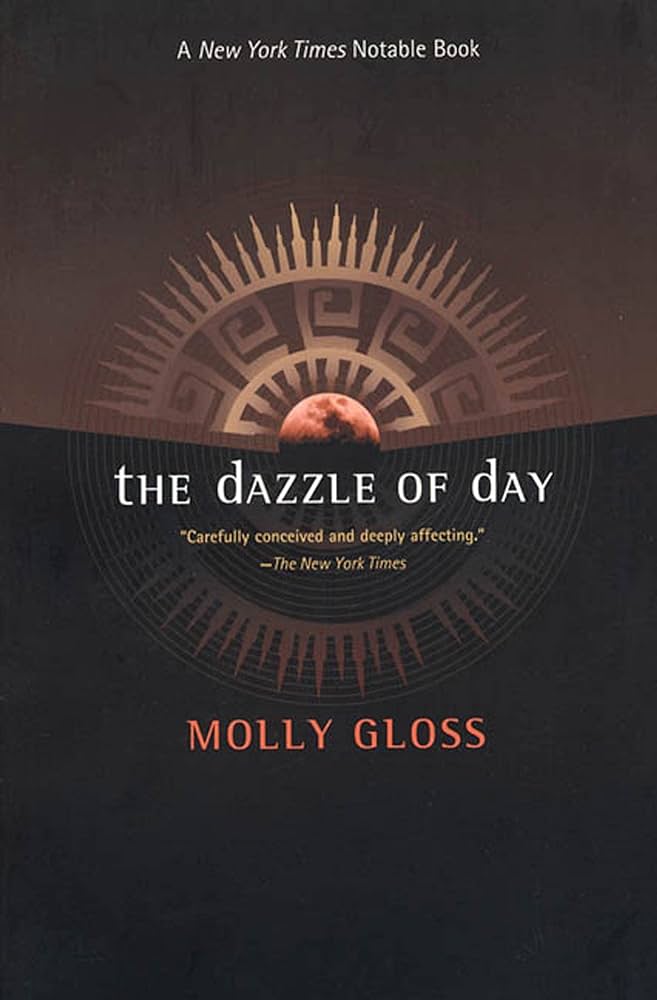The Dazzle of Day by Molly Gloss: A Review

I picked this book up entirely on a whim after seeing it at a used book store. The first thing I noticed, finding it on the end cap of the sci-fi fantasy section, was a blurb on the back cover by Ursula Le Guin. That alone would have been enough for me, but I'd also read one of Gloss's other books, Outside the Gates a few years earlier and really enjoyed it, so I thought this was a safe enough bet.
Stories about generation ships are always fraught, I feel, and so I was a bit nervous starting this one. I'm fascinated by these types of stories. They hold so much potential when it comes to the realities they echo and speak to—of movement and change and fear and the unknown. But it's so easy for them to fall back into the colonial fantasy of conquering a wild, new place across the stars. There are so many stories about colony ships that just unquestioningly replicate colonial dynamics.
This book, though, does so much to speak to and against that impulse, while asking very real questions about how to cope, as a society, with being put in an impossible position by generations long gone. How do we make a life worth living out of what the past has left us with? How do we build a fairer world, when human pain and hardship and death and incompatibility continue to push us back into old patterns, old habits?
Like generation ships, utopias are fraught and fascinating metaphors in fiction, and ones that so often go wrong when an author can't step outside themself and their own perspective to ask who is making the definitions and who is benefiting from them. Or even worse, when the author assumes the problem of creating a better world can be settled, allowing us to transcend politics and live only for "the human." No such world could ever exist, I believe, nor should we strive for one. A world that thinks its problems solved is a world that refuses to see new problems as they emerge (Akwaeke Emezi wrote about this beautifully in their book Pet as well).
But Gloss leads us through a society many hundreds of years after departure from Earth, in search of another world to make home, of another way to live their lives, and tells us gently that the only utopia we will ever have is the one we decide, every day, to wake up and continue to make for ourselves.
the story
The novel focuses on a generation ship of Quakers (or at least a society founded on Quaker ideals) who have, after 400 years, finally reached the nearest of a few possible planets with the intent to re-establish human life. In the meantime, they've lived in a vast torus, terraformed to sustain a variety of plant and animal life as well as several thousand humans broken up into smaller, interconnected communities. They follow a decentralized leadership system, in which communities hold meetings led by facilitators, who do not make decisions or lecture, but who ask questions that have been posed by the community and guide conversation as community members work to answer. Decisions are made unanimously or not at all, and they take as much time as they need to. Everyone is welcome to speak at meetings, to pose their own questions, to speak on any issue that they're so moved to address the group about.
This comes with as many problems as it does benefits. Some people are lonely and take up more than their fair share of time with issues that concern only themselves. Some facilitators are less skilled than others at guiding the conversation and making space for everyone. Often, important issues go undecided for long stretches, even when it would be better to have the matter settled. It poses particular challenges when a group of scouts to their new planet find it a barely habitable world of ice, far removed from the semi-tropical climes their ship maintains year-round, and the question emerges: Do we end our journey here? Or do we carry on in search of a more forgiving planet?
It's a question the characters spend the story grappling with in some way or another. Do we accept the world that we've been given, in all its hardships? Or do we leave in hope of finding something different? Something better? It's also a compelling mirror to many of the questions that may have emerged for readers in the wake of the initial departure from Earth: What does it mean to abandon a planet ravaged by capitalism, climate destruction, and human greed? Who gets to leave and who gets left behind? What responsibility do we have to the planet we come from? To the planet we claim next as our home?
People continue to have difficulties with their families, their lives, their bodies, their marriages. The characters experience the death of children, sexual violation, lost love, heartbreak, depression, and disability. It's not a world without violence and hardship. But it's a world focused on reparative work. On the ways we can help make each other better, and be better ourselves through constant effort.
I won't spoil the ending for anyone who wants to read it, but this was one of the first books I've read that, I felt, succeeded at imagining the utopian without falling too deeply into either cynicism or idealism. Utopias are always crumbling into dystopias or slipping into the realm of propaganda, but I really appreciate the way this book challenges us to imagine a utopia we refuse to give up on, even as the imperfections of our human lives ensures that we'll never completely reach it.